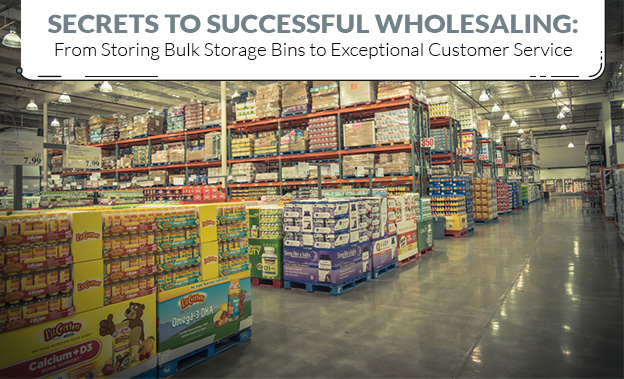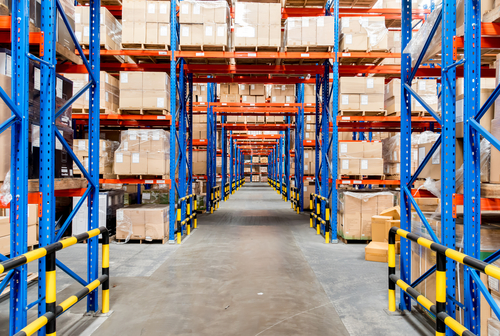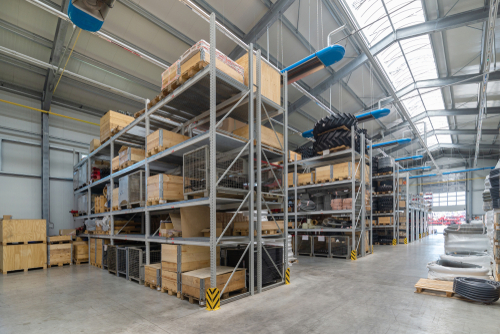 Manufacturers rarely sell their products directly to consumers or even retailers. Instead, companies in the middle, known as wholesalers, typically buy products in bulk from manufacturers and sell these products to retailers, who then sell them to consumers. This is the backbone of the supply chain as items slowly make their way from one vendor to the next, with each company making a profit along the way.
Manufacturers rarely sell their products directly to consumers or even retailers. Instead, companies in the middle, known as wholesalers, typically buy products in bulk from manufacturers and sell these products to retailers, who then sell them to consumers. This is the backbone of the supply chain as items slowly make their way from one vendor to the next, with each company making a profit along the way.
Wholesalers play a vital role in the global economy, making sure retailers have access to the goods they need to keep their customers happy. This requires a great deal of storage space and organizational efficiency as wholesales do their best to maintain proper inventory levels with products coming and going on all sides.
If you’re thinking of getting into the wholesaling business, learn more about what makes this industry so unique, the challenges you’ll face and how to solve them.
What Is Wholesaling?
Manufacturers make products, from toilet paper to boxes of fruit and everything in between, and retailers sell these products to the public. But neither the manufacturer nor the retailer will have the storage space to keep large supplies of these products onsite. To keep their products moving, the manufacturer will try to find a buyer as soon as possible, but the retailer usually won’t have the means to buy so many products at once. That’s where the wholesaler comes into the mix.
The wholesaler, usually with a large storage facility at their disposal, will buy products in bulk directly from the manufacturer and then sell smaller amounts to several different retailers. When the wholesaler buys in bulk, the manufacturer will offer them a lower rate so that they can move their inventory as quickly as possible. Then, the wholesaler will mark up the price per item before selling large quantities to retailers. Finally, the retailer will again mark up the prices before selling these items to the consumer.
- Here’s an example: A cereal manufacturer sells 500 boxes to a wholesaler at a rate of one dollar per box. The wholesaler will then sell shipments of 50 boxes to individual retailers at a rate of two dollars per box. The retailer will then sell these boxes to consumers at a rate of four dollars per box, the typical market value for a box of cereal. The manufacturer can sell hundreds of boxes quickly, the wholesaler is making a profit of $500, and the retailer is making a profit of $100. Of course, the wholesaler will have additional overhead expenses which will eat into those profits, including renting and maintaining their warehouse space, storing and cataloging their inventory, insurance and delivering large quantities of items to retailers.
Different Types of Wholesaling
Wholesalers serve different purposes in different industries, but the idea generally stays the same. In some industries, the wholesaler may sell items in bulk that are used to make other items, such as lumber, steel, plastic, flour, grains and other common ingredients and supplies. These items will then be used by other manufacturers to make a variety of other products.
In other cases, the wholesaler may sell items in bulk directly to consumers. Stores like Costco and Sam’s Club have upended the traditional supply chain in recent years, helping consumers save money on products they use every day, such as toilet paper, dog food and other common household essentials.
Regardless of the supplier or the buyer, wholesalers buy items in bulk, mark up the prices and then pass these items along through the supply chain. It’s all about maintaining proper inventory levels, making sure your customers are satisfied and keeping up with supply and demand.
Success Stories
When we think of wholesalers, two companies typically come to mind: Sam’s Club and Costco. These chains have retail outlets all over the country, selling products in bulk to consumers at a price that helps them save money. Consumers need to use the same products every day, so buying some items in bulk might make a lot of sense. Small businesses can also save money by shopping at these stores. This also means consumers and businesses don’t have to keep running to the store, saving them precious fuel and time.
Sam’s Club
Part of the Walmart Inc. family, Sam’s Club is a large wholesale retailer that sells directly to consumers, including common household items like toilet paper and food. Members pay a membership fee to shop at the store, but as long as they shop there regularly, they’ll still pay less than they would if they shopped at a normal retailer. The first Sam’s Club opened in Oklahoma in 1983, and now there are almost 600 locations across the U.S. and Puerto Rico. Most clubs average 136,000 square feet, so consumers have a lot of ground to cover. Despite numerous store closings across the country, the company’s total revenue was $59 billion for the fiscal year ending January 31, 2018.
Costco
One of the nation’s top three retailers, Costco is another shining example of wholesaling success. The company also has around 600 stores across the country, generating $93 billion in annual sales. It has 64 million subscribers that each pay an annual fee to shop there, but the company never marks up its products more than 15%, so consumers are still getting one of the best deals in town.
Tips for Successful Wholesaling
Your reputation is everything in the wholesaling industry. Your customers expect you to always have a certain number of products on hand so that they can meet the needs of their customers. You’ll also need to keep a good rapport with your suppliers, so you can keep buying from them in the future. With so much ebb and flow, your company needs to stay on its toes. Use these tips to start your wholesaling business off on the right foot.
- Setting Your Prices: Before you open up shop, you’ll need to set prices for your customers. The manufacturer will sell items to your company in bulk, but then it’s up to you to figure out at what quantity and price you want in order to sell these items to your customers. If you mark up these items to high, you could lose out to more affordable retailers, but if you go too low, your company won’t make enough to cover all your warehousing and transportation costs. Your company operates in the middle, so it’s best to set your prices somewhere in between the manufacturer’s prices and the current market value of these items.
Wholesalers will also leverage what’s known as tiered pricing, which means charging less per item for larger orders, to encourage their customers to buy in bulk. This will save your company precious time by helping you move your inventory as quickly as possible without having to secure additional buyers. Lowering the price per item for larger orders can also help secure your footing in the marketplace as you forge long-term relationships with some of the biggest retailers in town.
- Managing Your Credit: Another hurdle you’ll have to face is making sure your company gets paid. You’ll need to pay the manufacturer for their goods while also securing payment from your customers. This back and forth can get you into trouble unless you have plenty of capital on hand to hold you over until all of your invoices clear. You’ll need to keep an eye on your payments and invoices to make sure you’re not overextending your credit. Some customers may ask you for an extension from time to time or a higher credit limit. Manage your finances responsibly and only raise the credit limit for customers that have a long history of paying their bills on time. Managing these payments can be tricky. You don’t want to nag your customers and jeopardize these relationships, but you also need to pay your bills and keep up with your inventory. Set strict payment guidelines for all your customers, so there’s no confusion when payday rolls around.
- Storage and Organization: Being a wholesaler means being in the storage industry. You’ll need to either build or rent a warehouse for all these bulk orders while keeping these items organized. Having the right equipment is essential when it comes to making the most of your warehouse space, which also tends to be one of the most expensive aspects of running a wholesale business. To keep your costs low, you’ll need to invest in bulk storage containers that use space efficiently. Ideally, you’ll be able to stack your containers on top of one another using a stack rack, without impeding your access to the items inside.
Finding the right storage materials for your business all depends on what kinds of items you’re selling. Bulk bags are great for agricultural, construction and manufacturing materials. Wire storage baskets are great for consumer goods. Plastic totes are perfect for bulk food orders and fresh produce. Regardless of what you’re selling, keep these containers organized and labeled for optimum efficiency.

- Customer Service: There are plenty of customers to keep happy when you’re in the wholesaling business. You have the manufacturers to deal with on one end and your customers on the other. You’ll need a positive reputation if you want to keep selling to the same customers again and again. But keeping everyone happy means playing both sides at once. You can’t keep your customers satisfied unless your suppliers hold up their end of the bargain. Essentially, there’s only so much you can control. But you can start by working with reliable suppliers that keep your business nimble. You should be able to get the products you need without a lot of grief or costly delays. Your customers will have plenty of needs and concerns of their own, but bending to their needs shouldn’t put other aspects of your business at risk. Try to keep the bigger picture in mind when responding to your customers’ concerns.
- Maintaining Your Inventory: Your inventory is always changing; that’s just how the industry works. But instead of flying blind, you can use a digital inventory management system to anticipate your customer’s future needs. Many of these programs come with analytics tools that keep a record of your customer’s buying habits to predict future demand. If your customers have a habit of scaling back their orders during a certain time of year, you can start to prepare for these changes in demand sooner rather than later. You don’t want to get stuck with too much inventory, which means you’ll have to spend a fortune storing products that no one wants to buy.
These programs also help you manage your inventory in real-time. With a proper barcode system, you can scan bulk orders throughout the supply chain, so you don’t have to worry about losing track of one of your orders. If an item is delayed, you’ll be the first to know so that you can pass this information along to your customers. With orders costing thousands of dollars or more, you can’t afford to let anything slip between the cracks.
You can also create a profile of your suppliers to make sure they’re doing their part. If one of your suppliers has a habit of missing delivery deadlines or shipping out damaged products, you can keep a record of their performance and hold them accountable if this continues to be a problem. You can’t keep your customers satisfied if your suppliers fail to deliver the goods as promised.
As you can see, wholesaling is a complicated industry with a lot of moving parts. You need to balance your inventory, suppliers and customers to make sure you’re keeping up with demand. Having the right bulk storage bins will help you keep track of your inventory while it’s in the warehouse. A digital inventory management system helps you monitor the supply chain as these products move from one checkpoint to the next. Your wholesaling business is only as good as its reputation. Instill the value of customer service in your employees and do your best to keep all your business partners satisfied.







